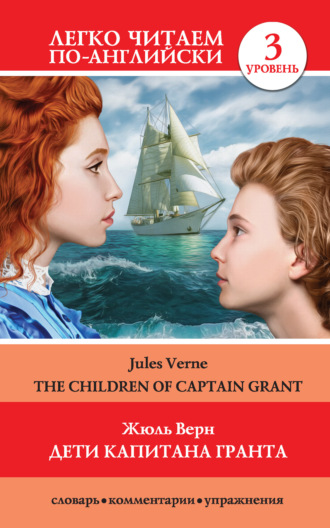
Жюль Верн
Дети капитана Гранта / The Children of Captain Grant
Chapter IV. Lady Glenarvan’s Proposal
Lady Helena began to interrogate Miss Grant, asking her about her past life and her present circumstances. It was a touching, simple story she heard in reply, and one which increased her sympathy for the young girl.
Mary and Robert were the captain’s only children. Harry Grant was a fearless sailor and lived in Dundee[27], in Perthshire[28], Scotland. His father had given him a thorough education. He lost his wife when Robert was born, and during his long voyages he left his little ones in charge of his cousin, a good old lady. Now, the old cousin has died, and Harry Grant’s two children were left alone in the world.
Mary Grant was then only fourteen, but she devoted herself entirely to her little brother, who was still a mere child. She managed to support and educate him, working day and night, denying herself everything, that she might give him all he needed, watching over him and caring for him like a mother.
The two children were living in Dundee, struggling patiently and courageously with their poverty. Mary thought only of her brother, and indulged in dreams of a prosperous future for him. She was fully persuaded that her father was dead. What, then, was her emotion when she accidentally saw the notice in the TIMES!
She decided to go to Dumbartonshire immediately, to learn the best and worst. She told her brother about the advertisement, and the two children took the train, and arrived in the evening at Malcolm Castle.
Such was Mary Grant’s sorrowful story, and she recounted it in a simple and unaffected manner. But Lady Helena put her arms round both the children, and could not restrain her tears.
As for Robert, while his sister was speaking, he gazed at her with wide-open eyes, only knowing now how much she had done and suffered for him; and, as she ended, he exclaimed:
“Oh, mamma! My dear little mamma!”
It was quite dark by this time, and Lady Helena made the children go to bed, for she knew they must’ve been tired after their journey. They were soon both sound asleep, dreaming of happy days.
Mary Grant and her brother were up very early next morning, and were walking about in the courtyard when they heard the sound of a carriage approaching. It was Lord Glenarvan; and, almost immediately, Lady Helena and the Major came out to meet him.
Lady Helena flew toward her husband; but he embraced her silently, and looked gloomy and disappointed—indeed, even furious.
“Well, Edward?” she said; “tell me.”
“Well, Helena, dear; those people have no heart!”
“They have refused?”
“Yes. They have refused me a ship! They declared the document was obscure and unintelligible. And, then, they said it was two years since they were cast away, and there was little chance of finding them. They said that the search would be vain and perilous, and cost more lives than it saved. The truth is, they remembered Captain Grant’s projects, and that is the secret of the whole affair. So the poor fellow is lost forever.”
“My father! My poor father!” cried Mary Grant, throwing herself on her knees before Lord Glenarvan, who exclaimed in amazement:
“Your father? What? Is this Miss—”
“Yes, Edward,” said Lady Helena; “this is Miss Mary Grant and her brother.”
“Oh! Miss Grant,” said Lord Glenarvan, raising the young girl, “if I had known of your presence—”
He said no more, and there was a painful silence in the courtyard, broken only by sobs. No one spoke. At last the Major said, addressing Lord Glenarvan: “Then you have no hope whatever?”
“None,” was the reply.
“Very well, then,” exclaimed little Robert, “I’ll go and speak to those people myself, and we’ll see if they—” He did not complete his sentence, for his sister stopped him.
“No, Robert,” said Mary Grant, “we will thank this noble lord and lady for what they have done for us, and never cease to think of them with gratitude; and then we’ll both go together.”
“Mary!” said Lady Helena, in a tone of surprise.
“Go where?” asked Lord Glenarvan.
“I am going to throw myself at the Queen’s feet, and we shall see if she will be deaf to the prayers of two children, who implore their father’s life.”
Lord Glenarvan shook his head. Lady Glenarvan felt the young girl’s attempt would be useless. Suddenly, a grand, generous purpose fired her soul, and she called out: “Mary Grant! Wait, my child, and listen to what I’m going to say.”
The young wife went up to her husband, and said, with tears in her eyes, though her voice was firm, and her face beamed with animation: “Edward, God has sent that letter to us—to us! Undoubtedly God intends us to undertake the rescue of these poor men.”
“What do you mean, Helena?”
“Well, Edward, to please me you planned a pleasure trip; but what could give us such genuine pleasure, or be so useful, as to save those unfortunate fellows?”
“Helena!” exclaimed Lord Glenarvan.
“Yes, Edward, you understand me. The Duncan is a good strong ship, it can venture in the Southern Seas, or go round the world if necessary. Let us go, Edward; let us start off and search for Captain Grant!”
Lord Glenarvan made no reply to this bold proposition, but smiled, and, holding out his arms, drew his wife into a close, fond embrace. Mary and Robert seized her hands, and covered them with kisses; and the servants shouted with one voice, “Hurrah! Three cheers for Lord and Lady Glenarvan!”
Chapter V. The Departure of the Duncan
We have said already that Lady Helena was a brave, generous woman. Her husband had good reasons to be proud of such a wife. The idea of going to Captain Grant’s rescue had occurred to him in London when his request was refused. But now she herself proposed to go!
There was not an hour to be lost. A telegram was dispatched to John Mangles the very same day, conveying Lord Glenarvan’s orders to take the Duncan immediately to Glasgow, and to make preparations for a voyage to the Southern Seas, and possibly round the world, if necessary.
The Duncan was a steam yacht of the finest description. It had two masts; its engine, which was constructed on a new system, was a high-pressure one, of 160-horse power. It made seventeen miles an hour, a higher speed than any vessel had yet attained.
John Mangles understood his business[29]. Though he was only the captain of a pleasure yacht[30], he was one of the best skippers in Glasgow. He was thirty years of age, and his countenance expressed both courage and goodness. When Lord Glenarvan offered him the command of the Duncan, he accepted it with right good will, for he loved the master of Malcolm Castle, like a brother.
Tom Austin, the mate, was an old sailor, worthy of all confidence. The crew, consisting of twenty-five men, including the captain and chief officer, were all experienced sailors. And when the crew heard the news, they could not restrain their enthusiasm.
John Mangles did not forget to fit up the rooms of Lord and Lady Glenarvan for a long voyage. He had also to get cabins ready for the children of Captain Grant, as Lady Helena could not refuse Mary’s request to accompany her. As for young Robert, he was put in charge of John Mangles.
To complete the roll of passengers, we must name Major McNabbs. The Major was about fifty years of age, with a calm face and regular features—a man who did whatever he was told, of an excellent, indeed, a perfect temper; modest, silent, peaceable, and amiable, agreeing with everybody on every subject, never discussing, never disputing, never getting angry. Nothing could excite him, nothing could disturb him. As a cousin of Glenarvan, he lived in Malcolm Castle, and as a major he went with the Duncan.
The ship was to sail out with the tide at three o’clock on the morning of the 25th of August.
Chapter VI. An Unexpected Passenger
The sea was calm. McNabbs was talking to himself, as was his habit. He stood motionless, watching the track of the yacht. After some minutes of this silent contemplation he turned round, and suddenly found himself face to face with a stranger.
He was a tall, thin man, about forty years of age, and resembled a long nail with a big head. His head was large and massive, his forehead high, his chin very marked. His eyes were concealed by enormous round spectacles, and in his look was that peculiar indecision which is common to nyctalopes[31], or people who have a peculiar construction of the eye, which makes the sight imperfect in the day and better at night. It was evident that he was a lively, intelligent man.
The stranger’s excitement was a strong contrast to the Major’s placidity. He walked round McNabbs, looking at him and questioning him with his eyes.
The mysterious passenger seized his telescope, drew it out to its fullest extent, about four feet, and began gazing at the horizon, standing motionless with his legs wide apart. His examination lasted some few minutes, and then he lowered the glass.
McNabbs never moved a muscle of his face. This was too much for the stranger, and he called out, with an unmistakably foreign accent:
“Steward!”
He waited a minute, but nobody appeared, and he called again, still louder, “Steward!”
Mr. Olbinett[32] was passing that minute on his way from the galley.
“Who is he?” he thought to himself. “He can not possibly be one of Lord Glenarvan’s friends?”
He approached the unknown personage, who accosted him with the inquiry, “Are you the steward of this vessel?”
“Yes, sir,” replied Olbinett; “but I have not the honor of—”
“I am the passenger in cabin Number 6.”
“Number 6!” repeated the steward.
“Certainly; and your name, what is it?”
“Olbinett.”
“Well, Olbinett, my friend, we must think of breakfast, and that pretty quickly. It is thirty-six hours since I have had anything to eat, or rather thirty-six hours that I have been asleep—pardonable enough: I was going, without stopping, from Paris to Glasgow. What is the breakfast hour?”
“Nine o’clock,” replied Olbinett, mechanically.
“Ah, well,” said the stranger, “it is only eight o’clock at present. Bring me a glass of sherry and a biscuit while I am waiting.”
The stranger kept on talking incessantly, flying from one subject to another.
“The captain? Isn’t the captain up yet? And the chief officer? What is he doing? Is he asleep still? It is fine weather, fortunately, and the wind is favorable.”
Just at that moment John Mangles appeared at the top of the stairs.
“Here is the captain!” said Olbinett.
“Ah! Delighted, Captain Burton[33], delighted to make your acquaintance,” exclaimed the unknown.
John Mangles stood stupefied, at hearing himself called “Captain Burton.” But the new comer went on. “Allow me to shake hands with you, sir; and if I did not do so yesterday evening, it was only because I did not wish to be troublesome. But today, captain, it gives me great pleasure to begin my intercourse with you.”
John Mangles opened his eyes as wide as possible, and stood staring at Olbinett and the stranger alternately.
Without waiting for a reply, the fellow continued. “Now the introduction is made, my dear captain, we are old friends. Tell me how you like the Scotia?”
“What do you mean by ‘the Scotia’?” put in John Mangles at last.
“By ‘the Scotia’? Why, the ship we’re on, of course—a good ship that has been commended to me, not only for its physical qualities, but also for the moral qualities of its commander, the brave Captain Burton.”
“Sir,” interrupted John. “I am not Captain Burton.”
“Ah, is that so? Is it Mr. Burdness[34], the chief officer, that I am talking to at present?”
“Mr. Burdness!” repeated John Mangles. He asked himself whether the man was mad. He was beginning to explain the case, when Lord Glenarvan and his party came up. The stranger caught sight of them directly, and exclaimed:
“Ah! The passengers, the passengers! I hope you are going to introduce me to them, Mr. Burdness!”
But he could not wait, and going up to them with perfect grace, said, bowing to Miss Grant, “Madame;” then to Lady Helena, with another bow, “Miss;” and to Lord Glenarvan, “Sir.”
Here John Mangles interrupted him, and said, “Lord Glenarvan.”
“My Lord,” continued the unknown, “I beg pardon for presenting myself to you. I hope we shall soon become acquainted with each other, and that the company of these ladies will make our voyage on the Scotia appear as short as agreeable.”
Lady Helena and Miss Grant were too astonished to be able to utter a single word. Lord Glenarvan was more collected, and said, “Sir, to whom have I the honor of speaking?”
“To Jacques Eliacin Francois Marie Paganel[35], Secretary of the Geographical Society of Paris, Corresponding Member[36] of the Societies of Berlin, Bombay, Darmstadt, Leipzig, London, St. Petersburg, Vienna, and New York; Honorary Member[37] of the Royal Geographical and Ethnographical Institute of the East Indies.”
Chapter VII. Jacques Paganel is Undeceived
The Secretary of the Geographical Society was evidently an amiable personage, for all this was said in a most charming manner. His geographical works, his papers on modern discoveries, and his world-wide correspondence, gave him a most distinguished place among the scientists of France. Lord Glenarvan welcomed such a guest, and shook hands cordially.
“And now that our introductions are over,” he added, “you will allow me, Monsieur Paganel, to ask you a question?”
“Twenty, my Lord,” replied Paganel; “it will always be a pleasure to converse with you.”
“Was it last evening that you came on board this vessel?”
“Yes, my Lord, about 8 o’clock. I jumped into the Scotia, where I had booked my cabin before I left Paris. It was a dark night, and I saw no one on board, so I found cabin No. 6, and went to my berth immediately, for I had heard that the best way to prevent sea-sickness is to go to bed as soon as possible. And, moreover, I had been traveling for thirty hours.”
Paganel’s listeners understood the whole mystery, now, of his presence on the Duncan. The French traveler had mistaken his vessel. All was explained.
“So you wanted to travel to Calcutta, M. Paganel, right?”
“Yes, my Lord, to see India has been a purpose of my life. It will be the realization of my dreams, to find myself in the country of elephants!”
“Monsieur Jacques Paganel,” said Lord Glenarvan, after a brief pause, “I must tell you that you must give up the pleasure of a visit to India.”
“Give it up? And why? What! Captain Burton!”
“I am not Captain Burton,” said John Mangles.
“But the Scotia.”
“This vessel is not the Scotia.”
It would be impossible to depict the astonishment of Paganel. John Mangles could not suppress a smile. At last the poor fellow shrugged his shoulders, pushed down his spectacles over his nose and said:
“You are joking.”
But just at that very moment his eye fell on the wheel of the ship, and he saw the two words on it: Duncan. Glasgow.
“The Duncan! The Duncan!” he exclaimed, with a cry of despair, and rushed down the stairs, and away to his cabin.
“However,” said Lord Glenarvan, “I am not much astonished at it in Paganel. He is quite famous for such misadventures. One day he published a celebrated map of America, and put Japan in it! But for all that[38], he is one of the best geographers in France.”
“But what shall we do with the poor gentleman?” said Lady Helena; “we can’t take him with us to Patagonia.”
“Why not?” replied McNabbs, gravely. “We are not responsible for his mistakes.”
“Well, if he likes; he can disembark at the first place where we touch.”
While they were talking, Paganel came up again on the poop, looking very woebegone and crestfallen. He kept repeating incessantly the unlucky words, “The Duncan! The Duncan!”
He could find no others in his vocabulary. He gazed inquiringly over the wide ocean, at the far horizon. At length[39] he accosted Lord Glenarvan once more, and said—
“And this Duncan—where is it going?”
“To America, Monsieur Paganel,” was the reply.
“And to what particular part?”
“To Concepcion.”
“To Chili! To Chili!” cried the unfortunate geographer.
“Come, Monsieur Paganel, don’t despair. It can all be managed. We shall soon put in at Madeira, and you will get a ship there to take you back to Europe.”
“Thanks, my Lord. But people will say it is a most extraordinary adventure, and it is only to me such things happen… But the Duncan is a pleasure yacht, is it not?” began Paganel again, after a fresh examination of the vessel.
“Yes, sir,” said John Mangles, “and belongs to Lord Glenarvan.”






